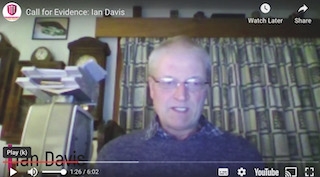[Content warning - this article contains references to suicide]
Lawnmower repair man Ian Davis was one of the victims of the £237m London Capital & Finance (LCF) mini-bond collapse scandal.
It not only cost him his £600,000 in life savings but his life too.
His resultant frustration at trying to seek justice and compensation for the scam led to him taking his life at the age of just 61 earlier this year.
His moving story is featured in an exclusive article in the latest issue of Financial Planning Today magazine which reveals the often forgotten devastating human cost of financial scams.
The article is by Transparency Task Force (TTF) founder Andy Agathangelou. Despite his losses, Mr Davis was also a popular volunteer with the TTF which tries to shine a light on the damage that financial scams and poor regulation can cause.
Mr Agathangelou said: “Ian lost the will to live after being passed from pillar to post, from one authority to another, trying to piece together what had happened in the scam and trying to get the various agencies, including the FCA, to talk to him and help him.”
Mr Davis lost his entire life savings in an LCF investment that had been dishonestly sold as being safe, secure and properly regulated. It was none of these, Mr Agathangelou said.
Mr Agathangelou said he worried that there will be more financial scam victims.
He said: “There are so many people that have had their lives shattered through falling victim to a scam. It really isn’t just about the money - the cost to individuals that have been scammed cuts much deeper than simply the loss of money.”
Victims’ experiences adversely impact all areas of their lives, sometimes including the complete collapse of trust in others and even the onset of hyper-vigilance and paranoia.
Action Fraud said it receives around 18,000 calls a year which are characterised by ‘emotional distress’ plus around 250 calls a year which are characterised by a ‘threat to life’ due to the individual indicating suicidal tendencies.
The lived experience of scam victims can involve the loss of even the most basic things such as eating, heating and having somewhere safe to live: home repossessions are not uncommon, reported Mr Agathangelou.
Relationships suffer too. The embarrassment that individuals suffer can lead to them isolating themselves from their community, their close social circle and their family.
Scams can be as devastating as street crime or violent crime yet the perception among victims that they are not treated as seriously by the criminal justice system is widely shared, Mr Agathangelou said.
For example, some of the recent analysis on financial scams found that nearly a third of victims themselves thought they were gullible and responsible for losing their money. Another study found that 80% of individuals would be embarrassed if they fell for a scam and less than half would be willing to tell a close friend.
Mr Agathangelou said: “Having spoken to hundreds of scam victims I know one thing for certain - many of them are bitterly disappointed with the frequent failure of the authorities to investigate and prosecute the criminals. Knowing that the perpetrators are still at large, continuing to defraud people out of their life savings, is a painful thing. And for some victims, they have been battling for justice for years.”
In another example, Sue Flood, 65, lost her life savings when she was talked into transferring her BBC pension scheme into what turned out to be a scam by a regulated adviser. That was more than 12 years ago and she has been battling relentlessly for justice ever since.
She has been very open about the extreme emotional distress the scam caused, said Mr Agathangelou. But her situation has been made worse by her being 'hounded' by HMRC for more than 10 years.
Mr Agathangelou said: “It appears to some that HMRC does not distinguish between tax dodgers and victims of financial crime - they come after their tax money regardless and they have a reputation for going about that in an uncaring way. If I could change one thing about the way the authorities work, it would be to make them care; it so often seems they simply don’t.”
But the underlying problem is the failure of regulators, he warned. Before his death, Ian Davis told the Transparency Task Force: "It is clear to me that there is something very wrong with the regulatory framework. If reforms are not carried out, there will be many more cases like LCF in the future.”
Mr Agathangelou said: "I fear Ian will be proven right."
• There are many resources to help if you or any clients have been affected by any of the coverage in this article, including The Samaritans. Samaritans are available day or night, 365 days a year. You can call them for free on 116 123, email them at
The full version of this article is published in the latest edition of Financial Planning Today magazine. Financial Planning Today magazine is the only UK publication exclusively for Financial Planners and Paraplanners and is available in digital and print editions on subscription. For more details of subscription options click on 'My Account' on the website homepage (once you've registered for Financial Planning Today website).

